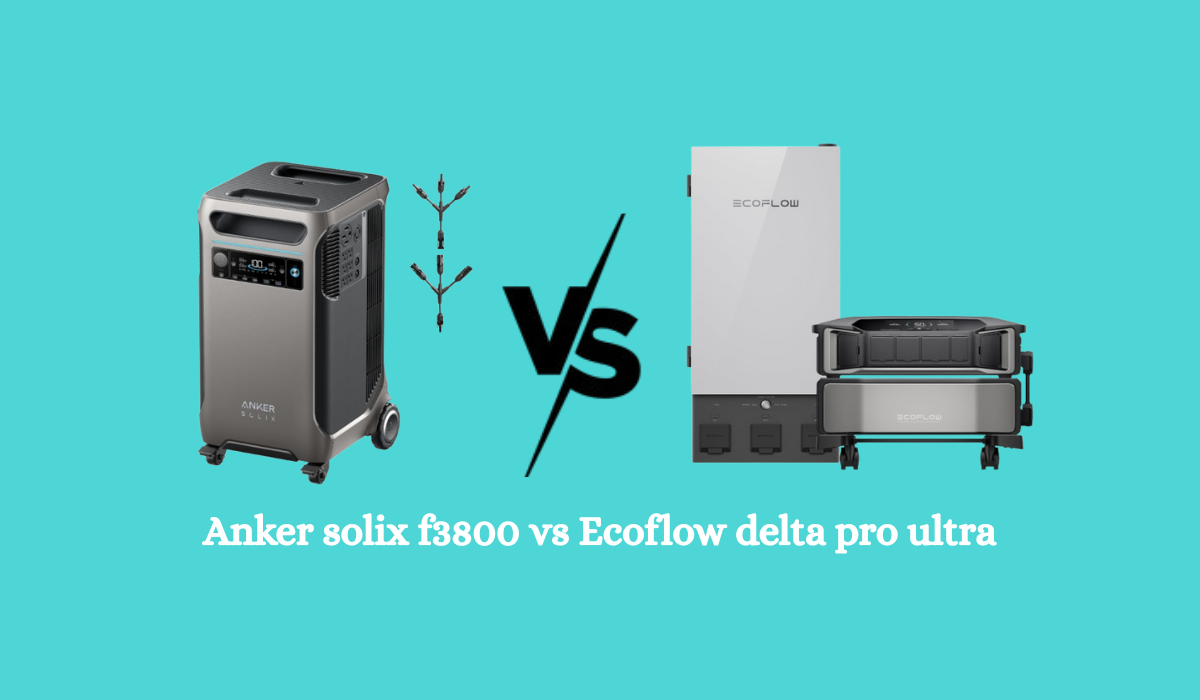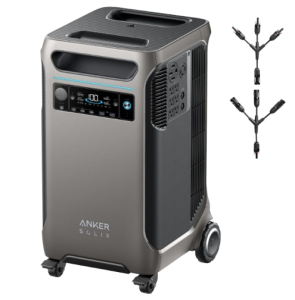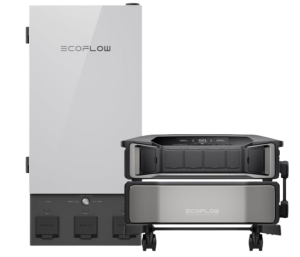
Anker Solix F3800 vs EcoFlow Delta Pro Ultra: Which Power Station Leads?

Portable power stations have become must-have tools for homes, RVs, and off-grid adventures. The Anker Solix F3800 and EcoFlow Delta Pro Ultra are two giants competing for the top spot in 2025.
Each model brings strong power output, advanced battery tech, and smart energy management, but their features serve different needs.
The Solix F3800 shines with its user-friendly setup and expandable capacity, while the Delta Pro Ultra delivers extreme power for larger energy demands.
Both promise reliable performance during blackouts and outdoor trips, yet their designs and price points target different types of users.
Understanding what sets them apart helps buyers make smarter choices before investing. This comparison explores performance, design, capacity, charging speed, and overall value to see which powerhouse fits your lifestyle best.
Anker SOLIX F3800 vs EcoFlow DELTA Pro Ultra: Which Power Station Is Better?
Portable power stations are now a key part of home backup systems, RV travel, and off-grid living. Two powerful models stand out in 2025 — Anker SOLIX F3800 and EcoFlow DELTA Pro Ultra.
Both promise huge capacity, strong output, and long battery life. Yet, each one serves a slightly different need. Let’s explore them one by one before comparing both in detail.
Anker SOLIX F3800
Product Details
The Anker SOLIX F3800 is a heavy-duty portable power station built for homes, RVs, and emergencies.
It delivers 3.84kWh capacity and a strong 6000W AC output with dual voltage (120V/240V) support. The station runs on LiFePO4 batteries, known for safety and long lifespan.
It supports both battery and solar power, giving users flexible energy options. With an expandable design, it can reach 26.9kWh by adding up to 6 battery packs.
The build feels solid, and the system offers advanced control through the Anker app via Wi-Fi or Bluetooth.
Features
-
Powerful 6000W AC Output for running all major appliances.
-
Expandable Battery System — from 3.84kWh up to 26.9kWh.
-
Dual Voltage (120V/240V) for flexible home or RV use.
-
EV Charging Port (NEMA 14-50) for direct car charging.
-
Durable LFP Batteries with over 10-year lifespan.
-
Smart App Control for easy power management.
-
5-Year Warranty ensures long-term reliability.
What Is the Good?
The SOLIX F3800 offers professional-grade power in a portable frame. It can handle nearly any home device, including dryers, fridges, and power tools.
The dual voltage support makes it stand out, especially for RV owners and home backup users.
The EV direct charging feature adds convenience, and the Anker app gives complete remote control. Its LFP battery provides safety, low heat, and long life.
The expandable design makes it future-proof for growing energy needs.
What Is the Bad?
Its weight (132 pounds) makes it hard to move around without help. The price also rises fast with extra battery packs. The solar charging input could be faster for users who depend mainly on solar power.
Another small issue is that it does not support stackable modular design like some newer systems, making expansion a bit bulky.
Overall Opinion
The Anker SOLIX F3800 fits families or RV users who need high output and expandable storage. It feels strong, reliable, and smartly built. The system offers a mix of solid engineering and practical power options for daily or emergency use.
EcoFlow DELTA Pro Ultra
Product Details
The EcoFlow DELTA Pro Ultra is a new-generation power station built for serious home backup. It carries a 6000Wh (6kWh) battery that can expand up to 90kWh, giving it one of the largest storage options in the market.
It runs at 7200W AC output, handling even large appliances like air conditioners. It uses LiFePO4 batteries that last over 3500 cycles, offering about 10 years of use.
The Ultra works with 120V and 240V, making it flexible for both small and heavy appliances.
Features
-
Expandable up to 90kWh, ideal for whole-home backup.
-
7200W AC Output — enough to run large home systems.
-
Supports 120V & 240V dual voltage in one inverter.
-
Fast 2-Hour Full Charge capability.
-
LFP Battery with 3500 cycles, safe and long-lasting.
-
Smart App Control via EcoFlow App (Wi-Fi or Bluetooth).
-
Modular Design with support for multiple batteries and inverters.
-
Auto Switchover (20 ms) for seamless home backup.
What Is the Good?
The DELTA Pro Ultra is a powerhouse. Its 90kWh expandable capacity can back up an entire home for days. The 7200W AC output easily handles heavy loads like central air conditioners or water heaters.
The smart home panel integration allows automatic power switching during outages, giving peace of mind. It also supports fast recharging, both from wall outlets and solar. The modular design helps in easy setup and future upgrades.
What Is the Bad?
The EcoFlow DELTA Pro Ultra is large, complex, and costly. It’s not very portable despite the wheels and stands. The setup might be too technical for users who just need basic power backup.
Also, since it’s still new, real-world feedback on long-term reliability is limited. It’s best for homes that plan full energy integration rather than small power needs.
Overall Opinion
The DELTA Pro Ultra is ideal for large homes or users who want full control over energy backup. It’s powerful, smart, and expandable. Though expensive, it replaces gas generators completely with clean, quiet energy.
Detailed Comparison: Anker SOLIX F3800 vs EcoFlow DELTA Pro Ultra
The Anker SOLIX F3800 and EcoFlow DELTA Pro Ultra both aim to deliver full-house backup in a portable design, yet they cater to different scales.
The SOLIX F3800 starts smaller, with 3.84kWh capacity and 6000W power, ideal for short outages or RV trips. It’s expandable up to 26.9kWh, which is enough for a few days of energy.
The DELTA Pro Ultra, on the other hand, begins at 6kWh but scales to an incredible 90kWh, making it suitable for full-home power during long blackouts.
Its 7200W AC output handles heavier loads than the Anker’s 6000W. Both use LiFePO4 batteries, ensuring safety and a long lifespan.
The EcoFlow wins in recharge time — only 2 hours compared to the Anker’s longer cycle. The Anker, though, offers better portability and easier use for RVs or mobile setups.
For everyday backup and mobility, the Anker SOLIX F3800 is the more practical choice. For large homes or full off-grid living, the EcoFlow DELTA Pro Ultra delivers unmatched performance.
FAQs
Q1: Can both power stations run heavy appliances like dryers or air conditioners?
Yes, both can. The Anker runs up to 6000W, while the EcoFlow Ultra handles up to 7200W, enough for large home devices.
Q2: Which model is better for RV use?
The Anker SOLIX F3800 fits RV use better because it supports NEMA 14-50 and L14-30 ports for direct RV connection.
Q3: How long can they last on one charge?
The runtime depends on load. The Anker (3.84kWh) can power a fridge for about a day. The EcoFlow (6kWh–90kWh) can run a home for several days.
Q4: Do both support solar charging?
Yes, both support solar charging. EcoFlow offers faster input and higher solar conversion efficiency.
Q5: Which one offers better value for money?
The Anker is more affordable and suits medium energy needs. The EcoFlow is more costly but perfect for full-house systems.
Conclusion
Both Anker SOLIX F3800 and EcoFlow DELTA Pro Ultra are top choices in the power station market. The Anker offers strong performance, easy setup, and practical expandability for homes and RVs.
The EcoFlow Ultra provides massive power, faster charging, and smart home integration for total energy independence. For portable users, the Anker SOLIX F3800 makes more sense.
For long-term home energy backup, the EcoFlow DELTA Pro Ultra stands ahead. Your choice depends on how much power your life truly needs.


